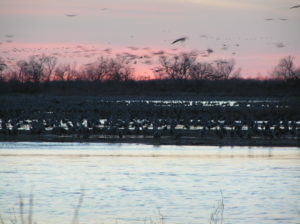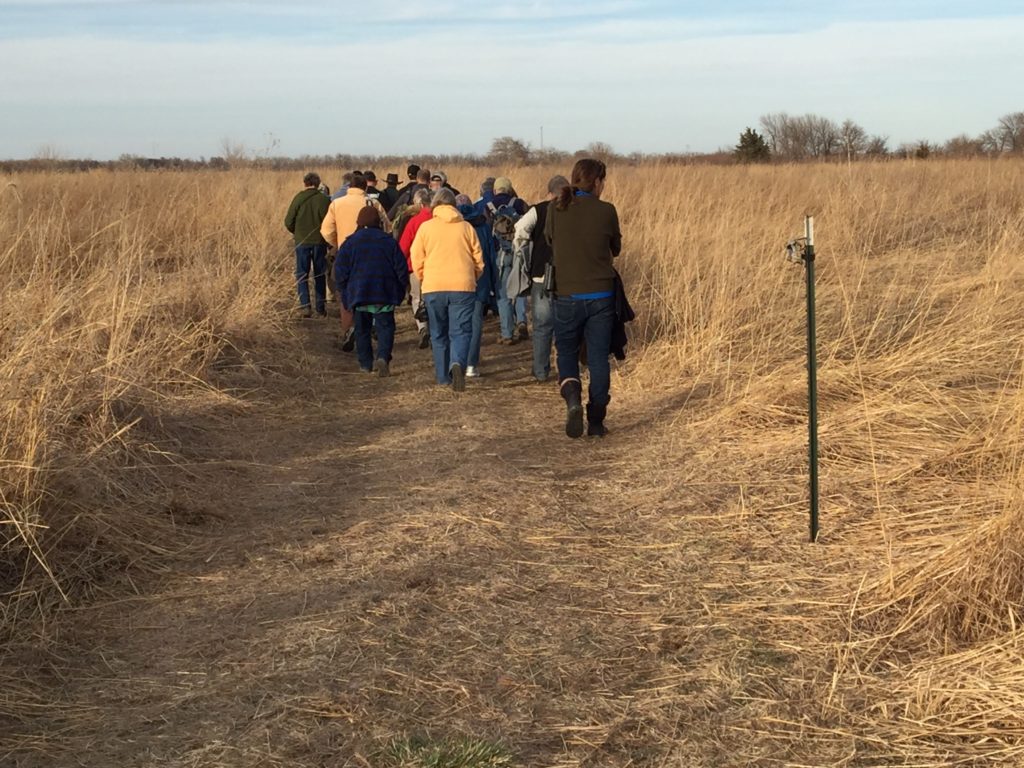A few days ago I drove west, as I do every spring, to join thousands of people who converge annually on the Platte River and the Rainwater Basin wetlands of south-central Nebraska. Nearly everybody who comes here comes to see some of the millions of migrating birds that congregate in this narrow stretch of the Central Flyway in March: sandhill cranes, ducks, geese, and more.
Some of us are also here to see people.
When I became a volunteer guide at Audubon’s Rowe Sanctuary in 2005, my motives were not entirely pure. I was a birdwatcher wanting to see lots of cranes, and if the price of admission was to walk out to the river with twenty or thirty people in my train, I was willing to do what it took.
Each morning, as visitors lined up at the windows of the viewing blind – essentially an elongated plywood shed – I stepped to the back wall, out of the way. These people, after all, were paying customers; and even from the back of the blind I had a fine view of the river, the sky, and thousands upon thousands of cranes. It was enough.
It was enough, but it was not all. Soon, I realized that I was watching the people who watched the cranes: a child who tugged at her father’s sleeve and whispered, “Oh, look!”; a couple with their heads bent together as they gazed through a single window; a man who stood with his eyes closed, hearing and feeling the thunder of wings overhead. In some groups, there might be a person or two – perhaps a spouse or a teenager – who appeared to have been dragged along on the outing. Still, the sight of ten thousand cranes has a way of winning people over. And as much as I relish watching the river and the birds, I’m often moved even more at the sight of faces transformed by wonder.
Ostensibly, my role at Rowe Sanctuary is to be a “guide.” But from my point of view, “facilitator” might be a better term; I define the word in the spirit of its Latin roots: “a person who helps others do something more easily.” I want newcomers to the river to feel that it’s easy to walk down a dirt path in the dark, easy to stand quietly as the sun rises and the world awakens. After that, my job is simply to step out of the way, while the cranes work their magic.
Why do I care? In his essay, “The Land Ethic,” Aldo Leopold observes, “No important change in ethics was ever accomplished without an internal change in our intellectual emphasis, loyalties, affections, and convictions.” I am convinced that moments of joy and wonder, like the joy and wonder we feel beside the river, can lead to those internal changes that ultimately alter how we view – and care for – the land.
If I can make it easy for someone to experience such a moment, then I’ve done my job as a facilitator. Better yet, I hope that after we all disperse again to our respective homes in other states and other flyways, they discover that it’s easy to experience – and then help protect – natural wonders wherever they live.


